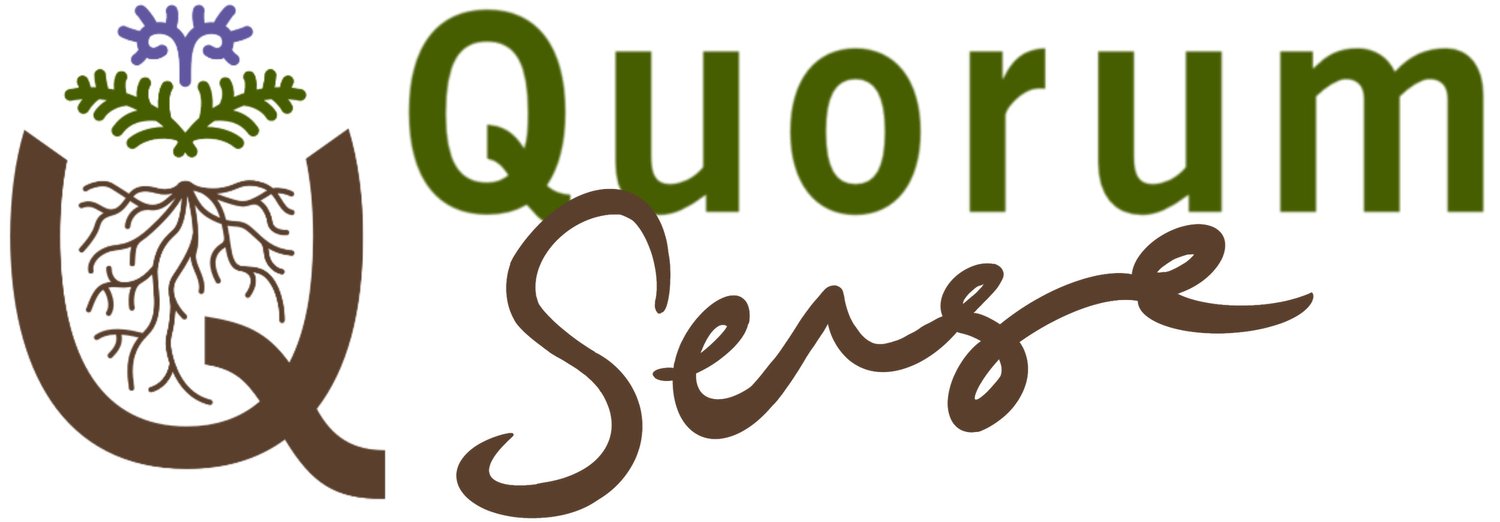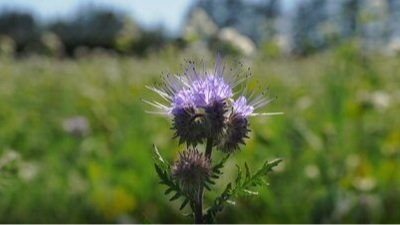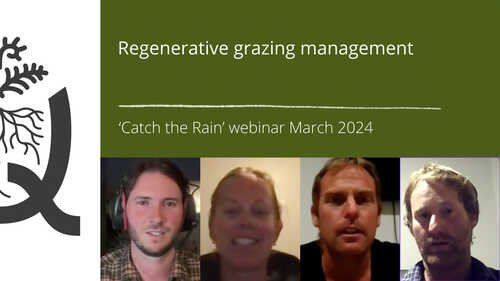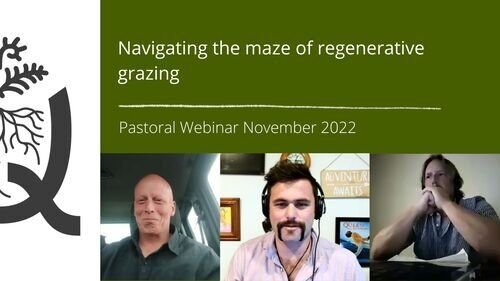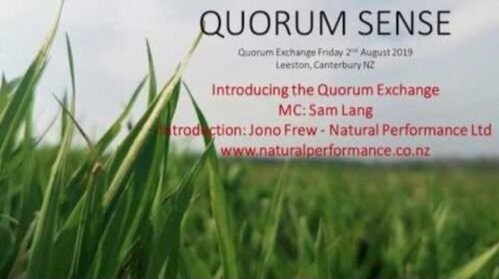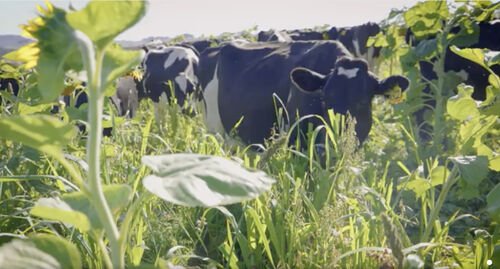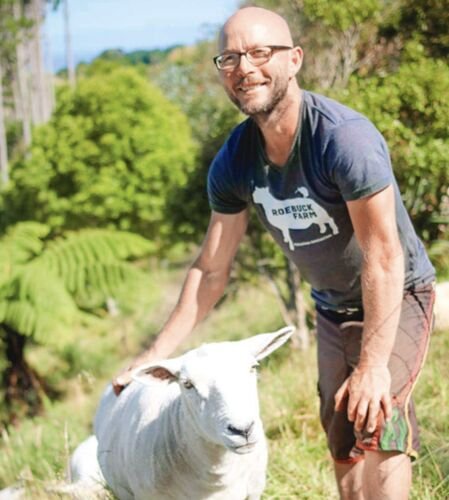The Quorum Sense content library
“Case studies, podcasts, webinar replays and event videos showcasing the knowledge and experiences of Quorum Sense farmers and our wider network.”
Browse the content below, search using keywords (e.g. Slugs, Deer, Otago, Hamish Bielski…) or click on the tags to find specific content.
Disclaimer: The information, opinions and ideas presented in this content is for information purposes only and does not constitute professional advice. Any reliance on the content provided is done at your own risk (click here to view full disclaimer).
Quorum Sense case studies
Catch the Rain: James Pearse and Brittany Talbot farm a 160ha property co-owned with James’ parents in Totara Valley, near Pleasant Point, New Zealand.
Exploring examples of how NZ farmers and growers are rebuilding the connection between the food they produce and the local communities that consume it.
Waikato's Tomtit Farm is supplying nutrient-dense produce direct to the local community, and connecting them directly to the land and people that produced it.
Dean Martin’s adaptive grazing management is growing soil organic matter, deeper rooting plants and supporting a sheep-based system built around thriving soil.
With its emphasis on community and sustainable ecosystems, Mangaroa Farms is integrating its beef, lamb and vegetable production with both nature and consumers.
The diverse but brittle Central Otago landscape farmed by the Rutherfords has been transformed through soil health, regenerative management and holistic decision-making.
Insights from four experienced livestock farmers who’ve developed their own unique regenerative approaches to regenerative livestock production.
The Bielski’s have tried, tested and evolved a high performance sheep grazing, cropping and pasture management system that's resilient, low input and profitable.
Five years in, Miah and Jenny Smith reflect on their regenerative dairying journey and the dramatic improvements in animal health, margins and their own quality of life.
Exploring regenerative innovation on two vineyards whose approaches to soils, plants, people and ecosystems are relevant to more than just viticulturalists.
Two very different vineyards, one in Marlborough another in Canterbury’s Waipara hills, offer different perspectives on what it means to operate regeneratively.
Improving the relationship between soil and plant health is fundamental to helping cycle nutrients and increasing nutrient availability to the vines.
In viticulture systems, cover crops can help reduce compaction, cut fertiliser use, improve water infiltration and lower pest and disease pressure.
Improving the relationship between soil and plant health is fundamental to helping cycle nutrients and increasing nutrient availability to the vines.
Innovative approaches being taken to explore alternative under-vine management that helps increase soil health and support healthy vines, yield and quality.
There are alternative ways to manage vineyard disease and insect pests that are less costly and don’t negatively impact beneficial microbial and insect life.
Improving livestock integration into cropping systems can bring a wide range of benefits and displace the need for increasingly expensive inputs.
Diving into how Canterbury arable farmers David Birkett and Nigel Greenwood have increased farm system health, resilience and profitability.
Introducing two Canterbury arable farmers who are increasing the health, resilience and profitability of their farm systems, with a focus on building soil health.
Farm data comparison of the crop management inputs and associated gross margins of biological or regenerative farming systems for three common arable crops.
Retaining crop residues and integrating cover crops are key practices that both protect the soil surface and keep living roots in the ground year-round.
Exploring different practices for building soil health and broader ecosystem health, which underpin the success of biological and regenerative arable systems.
Exploring different practices for building soil health and broader ecosystem health, which underpin the success of biological and regenerative arable systems.
Exploring different practices for building soil health and broader ecosystem health, which underpin the success of biological and regenerative arable systems.
Exploring different practices for building soil health and broader ecosystem health, which underpin the success of biological and regenerative arable systems.
Kiwi farmers have been leading the development of nature-based solutions to winter grazing challenges. Learn why, how and what they’re doing!
Bale Grazing is a wintering system where hay bales are spaced across the paddock, with stock grazing breaks of hay and pasture throughout the winter.
Bale Grazing is a wintering system where hay bales are spaced across the paddock, with stock grazing breaks of hay and pasture throughout the winter.
Bale Grazing is a wintering system where hay bales are spaced across the paddock, with stock grazing breaks of hay and pasture throughout the winter.
Comparison of kale vs multi-species winter cropping generated by Dylan Ditchfield using a mix of actual and estimated costs for the 2020/21 season.
The Quorum Sense Podcast
Waikato's Logan Wait is creating a direct-to-consumer path for meat from regenerative farms, connecting consumers and retailers with the stories of the farmers producing it.
The podcast heads to the Underground Festival in North Canterbury to capture some of the conversations that took place during this wonderful celebration of soil.
In-the-tractor with Otago dairy farmer Otto Dogterom to unpack his approach to farming, and the value he places on looking after finances, people and environment.
Tasmania farmer and food fanatic Matthew Evans shares his journey from chef and food critic to farmer-to-plate restaurant-owner via the wonders of soil health.
Hawke's Bay beef farmers and regen legends Rachel and Greg Hart share the story of how they've transformed their farm into a haven of life.
Australian farmer and educator Darren Doherty discusses farm systems function, design and management, and the common hurdles in practice and mindset.
Allen Williams shares his inspiring learning journey, returning to farming after 24 years in academia and teaming up with Gabe Brown to impact millions of acres.
Cattleman and educator Jim Elizondo discusses his experience trialing different grazing management regimes, and how plant behaviour changes as conditions change.
Kiwifruit orchard manager Levi Belcher shareds how he got started in the industry, and why he was attracted to soil health and regenerative practices.
.
Organic dairy farmer and Quorum Sense board member Willie White shares the impact going 'organic regen' is having on farm health, resilience and bottom line.
A leading voice on GE / GMOs, Professor Jack Heinemann (University of Canterbury) talks through the issues and shares insights around proposed changes to NZ regulations.
.
Waikato beef producers Carrie and Tom Andrews are creating a farm and butchery business built on the fundamentals of transparency, connection, responsibility, quality and resilience
.
An in-depth and personal conversation with third generation sheep and beef farmer Zeb Horrell, who openly discusses the challenges and opportunities facing our farming communities.
Manawatū dairy farmers Charlotte & Russell Heald talk about how their transition to farm ownership, to regenerative then to organic has them "living their dream life".
Kaukapakapa farmer Stephen Newman shares his journey in and out of dairy farming, discovering regenerative agriculture, growing kiwifruit and the power of farm discussion groups.
A fascinating discussion with multi-generational farmer David Musgrave about what's shaped our pastoral farming systems and what resilience to common problems can look like.
Part of our Wintering Innovations Series, join Deane Parker, Duncan Humm and Jono Frew as they discuss their experiences with new approaches to livestock wintering.
Dylan Graves discusses the powerful uses and functions of biochar, the wonders of soil and how anyone can make biochar on any scale.
This month, Jono speaks to Claire McKenzie, producer of Six Inches of Soil - a grassroots British documentary which Quorum Sense is bringing to New Zealand screens.
From his off-grid cabin, Northland-based beef farmer and Quorum Sense Team member Nick Tucker dives deep into the opportunities of having more, with less.
We talk to Manaaki Whenua Landcare Research's Peter Edwards and Open Farms founder Daniel Eb about social license and public perceptions of the ‘good farmer’.
Coromandel drystock farmer Ewan Campbell’s unorthodox approach to farming has seen him battle the system, revitalise his soils and win national food awards.
Renowned eco-nutritionist Phyllis Tichinin speaks passionately about the links and parallels between human health and the health of our food systems.
Manager of Motatapu Station, Central Otago, Brad Rudd’s excitement for farming is expressed in trying new things, and breeding resilience into his flock of sheep.
Passionate about food, farming and people, Australia's Charlie Arnott shares insights from his regenerative journey to create a more diverse, resilient and authentic farming system.
Cherryle Prew founded NZ’s only Soil Food Web lab 20 years ago. You’ll want to grab a cup of tea and a biscuit for this conversation!
The tables have turned for arable farmer Peter Legg, from initially learning off others’ knowledge and experience to now being someone others are learning from!
Father and daughter duo Shane Birchall and Meghan Schutt share their learnings and experiences in transitioning to a self-sufficient, low waste dairy and beef farm operation.
Canterbury farmer and Quorum Sense team member Sam Lang talks about the relationship between science and farmer experience, risk, and the importance of support networks.
New farm, new home, new partner, new baby! A whole lot has transformed for Jake Herron in the last two years. A real and refreshing story.
Quorum Sense webinar replays
Sam Lang is joined by guest farmers Dave Mitchell and Duncan Humm share how they (and other farmers) are successfully incorporating diverse forage crops into their farm systems.
Part of our Wintering Innovations Series, three dairy farmers share their alternative wintering journeys, where they're at now and what they've learned along the way.
Host Sam Lang and guest farmers Rhys Roberts (Align Farms) and Miah Smith explore techniques, successes and challenges bringing diverse pastures into NZ farming systems.
Hear from Mark Koopmans (North Canterbury), Jono Frew (Otago) and Russell Heald (Manawatu) as they discuss the practice of deferred grazing in New Zealand.
Sam Lang (Quorum Sense, Foothills Farming) and Jules Matthews (CREATE coach, Mangaroa Farms) share a simple process for identifying the limiting factors ‘putting a drag on your system’.
Hear from Mark Koopmans (North Canterbury), Rachel Short,(Taranaki) and Ross Johnson (Wairarapa) as they discuss regenerative grazing systems, techniques and farmer-led research.
Watch this webinar recording to learn from Soil Mentor's Abbey Rose how their app makes monitoring soil health on your farm easy and informative.
A tour of the Quorum Sense Regen Forum! You can see what's on offer, how it works, and get some tips and tricks for getting the most out of using it!
Hawke's Bay's Michael Reilly and Taranaki's Rachel Short share their experiences with livestock collar technology. What role can it play in NZ farming systems? What are the opportunities and concerns?
Andy’s research demonstrates complex interactions between physical soil structure and microbiome metabolism with significant implications for nutrient-use efficiency in soils.
Stephan Newman, and Phil & Jenny Grainger from the Kaipara Regen Ag group are involved with the City to Farm composting project lead by Betsy Kettle.
South Otago's Pete Blair and Hawke's Bay's Michael Reilly compare experiences navigating the multi-faceted maze of regenerative grazing techniques in very different contexts.
UK biological farmer Tim Parton shares his approach to arable crop production and how he’s come to work with nature, not against.
In this Quorum Sense webinar we will be focusing on grazing management and planning in a New Zealand landscape.
Following up our ‘Regenerative arable transitions’ case study, we deep-dive into regenerative arable production systems with David Birkett and the UK’s Clive Bailye.
In this second agroforestry webinar, Dr Colin Meurk joins us to discuss the benefits trees bring to agriculture, and how to select and plant for maximum impact.
First in a series of webinars on integrating trees into NZ farm systems, Hawke’s Bay farmer Greg Hart joins land manager and educator Darren J. Doherty.
This April 2021 webinar features four farmers panelist: Mark Anderson (Dairy), Rachel and Kenneth Short (Dairy)and Dean Martin (sheep and beef).
This April 2021 webinar features four farmers panelist: Mark Anderson (Dairy), Rachel and Kenneth Short (Dairy)and Dean Martin (sheep and beef).
This February 2021 webinar features four farmers: Jules Matthew (Sheep & Beef), Hamish Bielski (Sheep & Beef), Miah Smith (Dairy) and Mark Anderson (Dairy).
Gerry Gillespie talks us through how he came to develop the SPICE method, provides practical tips on the composting process and how to apply the end product.
Dr Johnson gives us an overview of his research as well as practical tips for producing and applying high quality compost for commercial farm systems.
In this fourth session of the 2020 Post-Harvest Debrief, we are joined by mixed arable farmers Mike Porter and Roger Small to discuss successes and learnings from this season.
A discussion following a conversation about slug control, featuring Abie Horrock from FAR and Simon Osborne who has been managing slugs in his no-till system for decades.
Angela Clifford from Eat New Zealand & The Food Farm shares her insights as both a small scale grower & marketer, and high level advocate in the NZ food system.
Hamish Bielski talks about his experience and advice for managing stocking rates, grazing densities, pasture growth and recovery periods post-drought.
Hamish Bielski talks about his experience and advice for managing stocking rates, grazing densities, pasture growth and recovery periods post-drought.
In this first session of the inaugural post-Harvest Debrief, Quorum Sense Chairman Nigel Greenwood shares what he's learnt from the trials he's run over the last three years.
Quorum Sense event videos
Regenerative farmer and grazing coach Siobhan Griffin talks about increasing soil organic matter, growing more grass, reducing costs and improving milk and cheese quality.
More biological products are coming onto the market. But do they work… how do they work… and what do you need to know before introducing them into your system?
More biological products are coming onto the market. But do they work… how do they work… and what do you need to know before introducing them into your system?
More biological products are coming onto the market. But do they work… how do they work… and what do you need to know before introducing them into your system?
More biological products are coming onto the market. But do they work… how do they work… and what do you need to know before introducing them into your system?
More biological products are coming onto the market. But do they work… how do they work… and what do you need to know before introducing them into your system?
More biological products are coming onto the market. But do they work… how do they work… and what do you need to know before introducing them into your system?
“Coming into farming on our own account without much experience meant we weren't tied to tradition and weren't afraid to try new things.”
Join all five presenters from the Wairarapa Quorum Exchange for the Questions and answers session. Guy Peacock, Miah Smith, Jules Matthews, Ross Johnson, Simon Osborne
“Lowering the cost of production, understanding nutrient cycling and building resilience into the farm’s performance.”
“We are part of a community that is committed to building community resilience, reliable food security and production. There is also a big commitment to education.”
“Key learnings for me are the importance of humility, perseverance, research, conceptual and creative thought.”
“We no longer follow the flock and have freedom to farm how we enjoy, without worry about judgement of industry.”
David Birkett incorporates cover crops into his high value seed crops and has done an immense amount of trial work in decreasing synthetic inputs of crops and soil tillage.
Ten years of higher grazing densities & longer recoveries have transformed Dean Martin’s previously unproductive pastures - ewes & lambs are now thriving on it!
Check out the high diversity cover crops being used by the Holdaway family on the 150ha vineyard to boost carbon cycling, beneficial insects and soil & plant health!
Audience questions posed to the panel, which was comprised of all the speakers from the Quorum Exchange 2019.
Jono Frew, farmer and co-founder of Quorum Sense, introduces the audience at the 'Quorum Exchange' to how Quorum Sense was established, what it hopes to achieve and how you can get involved.
This video is only the Q&A session following Peter Barrett's presentation at the Quorum Exchange August 2019 in Leeston.
Peter Barrett from Linnburn Station, Central Otago shares how they use cover crops as a strategic tool to enhance soil health, productivity and performance.
Mixed arable farmer Simon Osborne describes his farm system and discusses his use of cover crops, companion planting and other techniques for improving soil health and crop performance.
Mixed arable farmer Nigel Greenwood shares some of the techniques he uses for growing healthy soils and healthy crops that are resistant to pests and disease, reducing/eliminating chemical use.
South Otago sheep and beef farmer Hamish Bielski shares what he's learned over the last 3-4 years in creating a productive, profitable, and regenerating operation.
Dr Gwen Grelet presents scientific highlights on the importance of diversity, and shares her learnings from her US road trip where she visited a diversity of regenerative practitioners.
